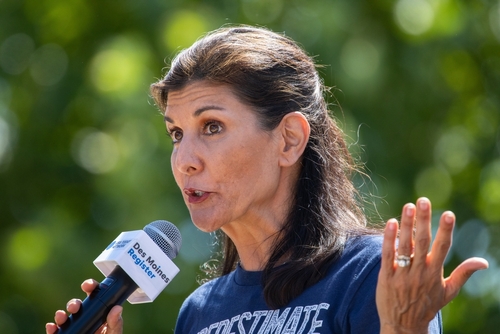Haley Backs Out Of Primary Pledge To Support Trump

Former South Carolina Gov. Nikki Haley, the last remaining Republican presidential challenger to President Donald Trump, has sparked new controversy with her refusal to confirm whether she would support Trump after he secures the 2024 GOP nomination. Her tacit approval of Joe Biden and infidelity to her campaign pledge to support the eventual Republican nominee departs from the united front typically expected in party politics.
Haley’s uncomfortably evasive statement came during an interview aired Sunday morning on ABC’s “This Week,” where she emphasized her opposition to Trump, stating, “I’m running against him because I don’t think he should be president. I don’t think he’s the right person at the right time.” Her focus, she claims, is solely on winning the election herself, thereby preventing what she perceives as the more significant threat — a presidency under Kamala Harris.
Haley’s approach raises questions about party unity and loyalty. Historically, Haley has been a proponent of supporting the eventual Republican nominee, a stance she affirmed when she raised her hand during the GOP debate.
Haley’s criticisms of Trump extend beyond mere electoral strategy. As a neoconservative beholden to the military-industrial complex, she has openly critiqued his America First stance on NATO, suggesting that his policies could undermine the alliance and encourage adversaries like Vladimir Putin.
Her criticisms of Trump, while ordinary politics in a competitive primary, should not overshadow the ultimate goal of the GOP to reclaim the presidency. The reluctance to support the party’s nominee, particularly one with Trump’s significant base and historical success, could fragment the Republican electorate, thereby aiding the Democratic opposition.
Moreover, Haley’s assertions regarding Trump’s electability must be weighed against her own performance in the primaries. With Trump leading in the delegate count and polls, the argument for Haley as the more electable candidate remains to be proven. Her focus should be articulating a compelling vision that resonates with the Republican base and the broader electorate of independent voters.
Haley’s ambition and willingness to easily discard previous promises to voters reflect a troubling trend of prioritizing personal success over party cohesion. The future of the Republican Party and the nation hinges not just on the primary process but on rallying together to promote conservative values and governance against the threat of another Biden-Harris term.






















